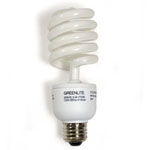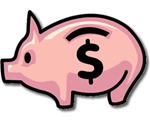 There are some really easy ways to start being frugal. This list is just the beginning to saving a lot of money.
There are some really easy ways to start being frugal. This list is just the beginning to saving a lot of money.
Automotive
Check your tires’ air pressure. This can increase your gas mileage by more than 10% depending on how bad they are. Make sure you do it at least each time the temperature changes.
Maintain your car. This is really hard for me to do. It seems like I’m flushing money down the toilet when I have to pay for repairs on my car. But maintenance is different than repairs. Getting regular oil changes, changing the air filter, and getting the wheels balanced will prevent major repairs and save you in gas money too.
Consolidate your trips. To save money on gas try making lists and only going places once. As the lists fill up make a single trip to the store. You’ll save time, money, and gas by cutting your little trips to the store for the occasional food item. A list at the grocery store will prevent impulse purchases as well.
In addition to making a list try planning your route. If you are coming past the hardware or the dry cleaner on the way home stop off then instead of making a special trip.
Home
Change the filter in your furnace. My dad is a professional heating and A/C man. Do you know the single biggest thing that makes him money? People not changing filters regularly. Dirty filters break more machines than any other factor combined. A new filter costs less than a dollar and is easy to replace. A dirty filter will drive up you’re A/C bill because your furnace is working overtime trying to move enough air through your house to get it to temperature. Changing the filter every 3 months is best but every six weeks would be better. You’ll be healthier and your utility bill will be lower.
Lower the thermostat in the winter and make it higher in the summer. Leaving your thermostat on 68 is a great way to cut your gas and electric bills down. The same goes for keeping the thermostat at 72 in the summer months. If you just can’t get warm at 68 degrees try a long sleeve shirt, slippers, and avoid lounging in your underwear. To feel nice a toasty try jumping on your treadmill or sipping some hot chocolate.
Make the switch to florescent light bulbs. As your incandescent light bulbs blow out replace them with the new florescent light bulbs. Each bulb you replace will save you up to 8 times the electricity usage. And if you’re wondering, yes, they are worth the investment. Depending on your electric bill the payoff time will vary. Not only do these new bulbs use less energy but they last longer, much longer. One word of warning, don’t buy the cheap ones. I did and I regret the decision. The no name cheap bulbs work fine at first but their life expectancy is very short. Buy the name brand bulbs and you’ll be happy you did.
Personal Finance
Take the credit cards out of your wallet. Consumers will spend billions of dollars in interest payments this year on consumer debt. Switching to an all cash way of life will save you from paying interest. While credit cards are convenient they can eat you alive without you even knowing it. The best thing to do is to cut up your cards. The next best thing is to take them out of your purse or wallet.
Limit your exposure to advertising. You’d be surprised how well marketers can make a ‘want’ become a ‘need’. Cutting the advertisements from your life can be difficult but there are some ways that work. For starters try renting a movie instead of watching one on cable. If you have a local library you can rent many of the TV shows running on prime time after the DVDs are released. Try to avoid shopping malls and new car lots. The less you know about a new product the less likely you are to think about it.
Make a budget. Budgets don’t have to be extravagant. Try something simple. If you know you spend a lot of money eating out every week try setting your budget to 20 dollars or less. Many bills that come in the mail just need to be paid but try paying yourself first. Setting little rules up like “I will pay myself 10% of each paycheck” is a great rule to live by. Once you pay yourself put that money into investments.
Make your meals at home. I am always blown away at how much money I spend on restaurants. It doesn’t take long for the money to add up. Make eating out a treat and only go with friends and family. Making food at home can be enjoyable. Recently my wife and I have been experimenting with making the perfect pizza. We try different dough recipes and use different sauces. We’ve also bought this cookbook: The New Best Recipe Book. I’ve found that the quality of the food I eat is much higher. It’s also healthier and cheaper too.
Free Entertainment. Libraries are full of great free entertainment. I’m not just talking about books either. As mentioned earlier libraries have a lot of audio books, DVDs, and videocassettes of new popular media. If you haven’t been there in awhile you might be surprised at what you’ll find. There are also a lot of free things to do in most cities. Museums, live shows, and art galleries can have a lot of hidden gems of fun. The other place to find a lot of free entertainment is the internet. No, I’m not talking about naughty pictures either. There are hours of great content to be found on podcasts, youtube, and blogs. Lastly spending time with the ones you love is always free. Play board games, cuddle, or tell each other stories.
The Final All Encompassing Tip
Plan Ahead. If there is one financial tip that will save you thousands it’s to plan ahead. Plan your grocery list, your budget, and your financial goals. The less planning you do the more you’ll be hit with a ‘poor-planning-premium’. Cell phone companies, grocerie stores, gas companies, and everyone else in the market charges a lot for people that prefer not to plan. Beat the curve and think everyday life through once a week.

 At one point in life it occurs that we should be saving for the future. Many people, due to upbringing or circumstance, have never thought about saving or investing. This post is written for those people. It’s not a bad thing to be one of them. I’m one of them and so are most of my friends and family. The general public doesn’t know much about money, but we’re learning.
At one point in life it occurs that we should be saving for the future. Many people, due to upbringing or circumstance, have never thought about saving or investing. This post is written for those people. It’s not a bad thing to be one of them. I’m one of them and so are most of my friends and family. The general public doesn’t know much about money, but we’re learning.